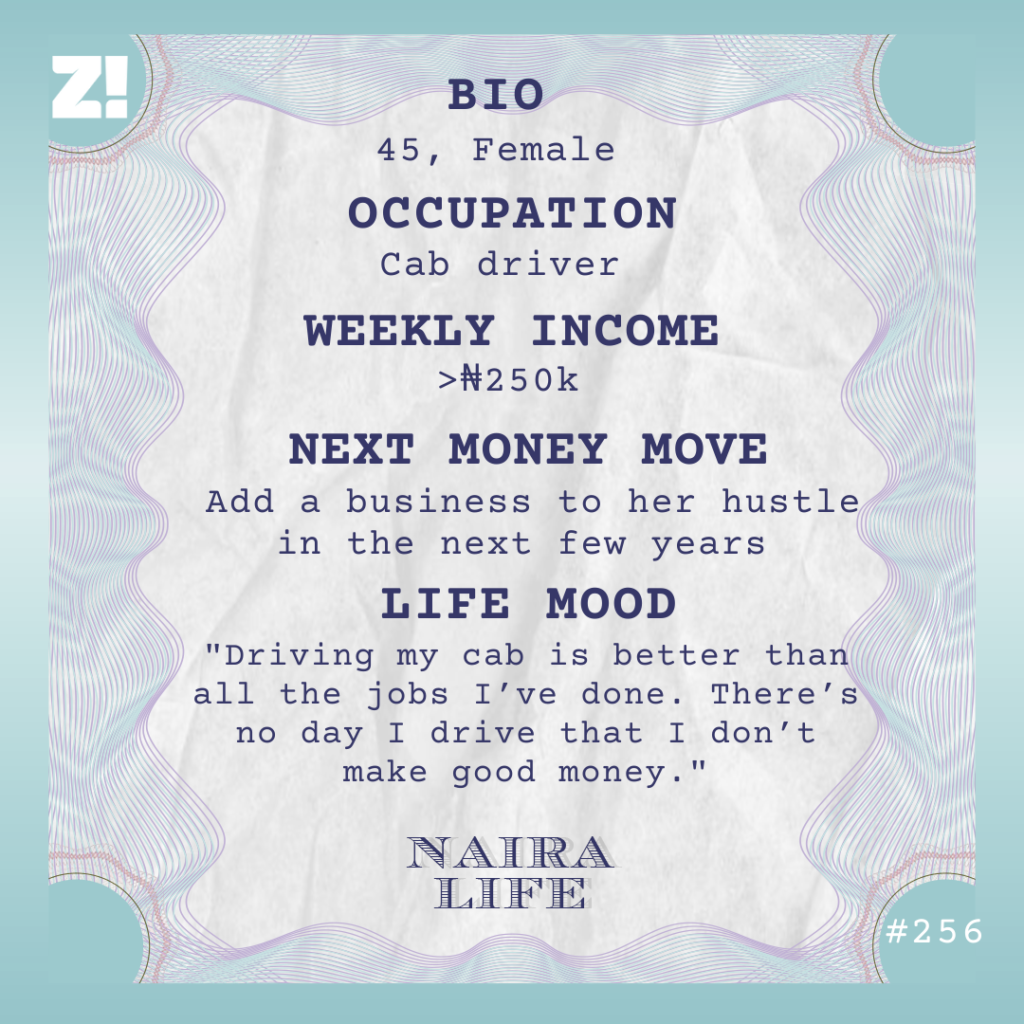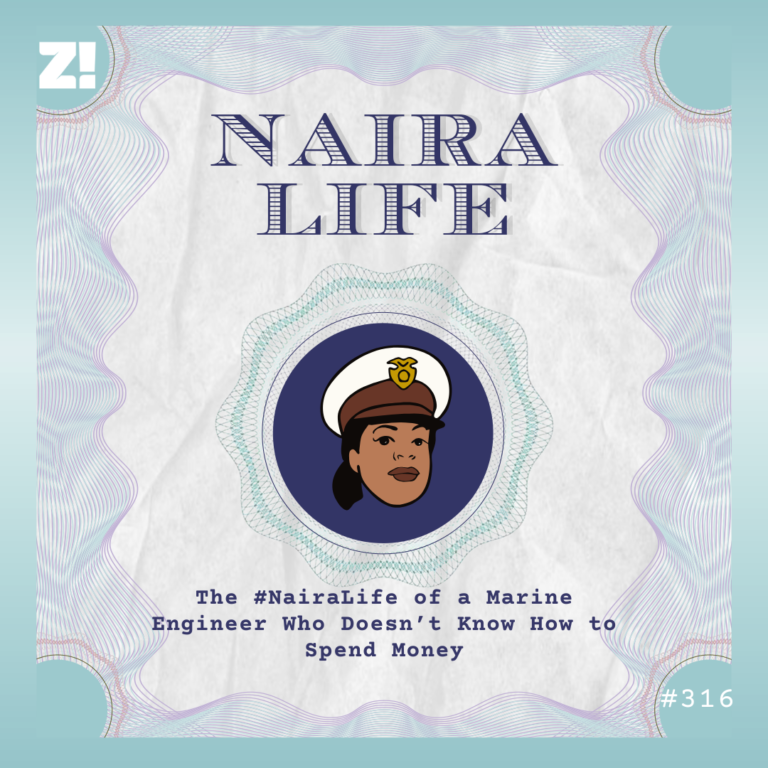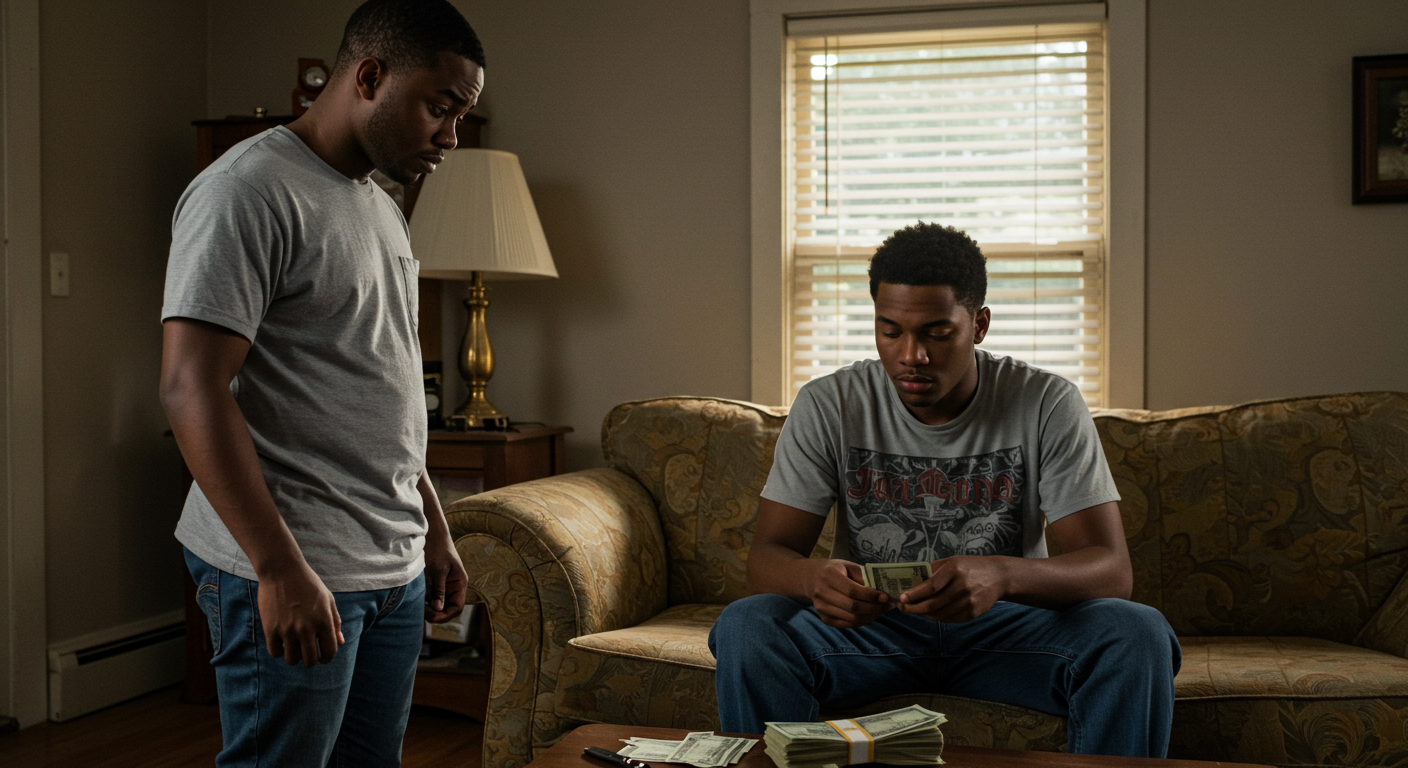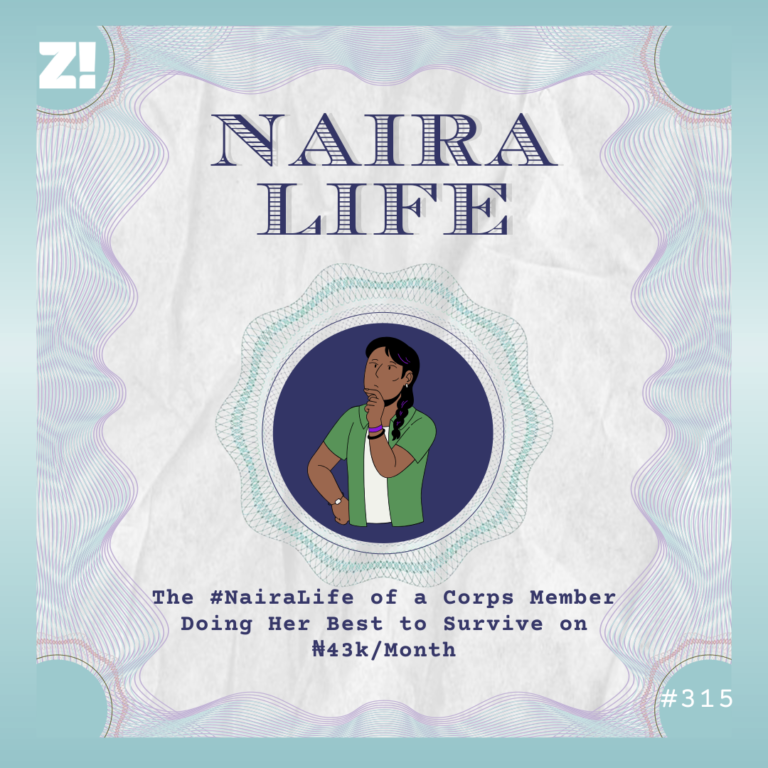Every week, Zikoko seeks to understand how people move the Naira in and out of their lives. Some stories will be struggle-ish, others will be bougie. All the time, it’ll be revealing.

What’s your earliest memory of money?
It has to be my mum paying me ₦10 – ₦20 weekly to work in her ice water nylon factory. Before pure water became a thing, there was ice water — cold water in clear nylons. We made those nylons in the factory, and I handled the cutter.
This was in the late 80s, and I was nine years old. ₦20 was the highest denomination, and I could buy Vip — a fruit drink — every day for five days and still have enough left to save in my kolo. Later, I’d give my mum what I’d saved to buy me Christmas clothes.
Sometimes, I’d buy about 20 pieces of puff-puff and share with my brothers. I’m the only girl among five siblings, so I had a sense of responsibility towards them.
Tell me more about your childhood
My dad died when I was almost 10, and there was no financial support from my dad’s family, so I was raised by my mum. My mum was so hardworking. She’d supply her nylons to markets in neighbouring states and do everything else she could lay her hands on — she sold everything from clothes to fashion accessories at different points. She wasn’t the type to wait for handouts, and she instilled those values in me.
She put me in charge of the house even before I was 9. A typical day in my life included waking up super early to sweep, do other house chores, and go to school or work at the factory if it was during the holidays.
My brothers also got to work. My mum would send them to farms to work and make money; she just wanted all her children to be as industrious as she was.
How long did you work at the factory?
About seven years. After finishing secondary school in 1995, my mum encouraged me to get a teaching job at a local private school, and my salary was ₦800/monthly. I barely got the salary because the school’s proprietress kept owing me. Thankfully, I didn’t have to stay there for long: I left for the polytechnic the following year.
While I was in school, my mum supported me by sending me earrings and other fashion accessories to sell and use the money for what I needed. Sometimes, I’d send part of the money I made back to her to get more goods through buses — there was no online banking then. I did that till I finished my National Diploma in 1999.
What happened after?
I studied banking, so I started a one-year internship at a bank. My salary was ₦5k monthly. The following year, I became a contract staff at the same bank, and my salary increased to ₦19k/month. I was the only one among my siblings with a stable income, so I’d usually send money to my siblings who were still in school.
I tried to return to school too. I needed to further my education to progress in my banking career and become a permanent staff member. I paid around ₦3k to register at the Chartered Institute of Bankers in 2001. The way the institute worked, you could attend classes for about six months before taking the exams. There were two exam diets annually, but I couldn’t focus because of work.
So, whenever I missed an exam, I’d re-enroll and try to prepare for the next exams. That happened at least twice. I still hadn’t figured it out when marriage jumped at me.
What do you mean “jumped”?
My husband and I were dating when I was at the institute. He’d regularly come to pick me up after classes. He was in a rush to get married, and somehow, I started rushing too. We got married in 2003.
I wish I hadn’t rushed because balancing school, career and the home was a struggle. I also supported the home financially because my husband didn’t make much. As a result, I abandoned the institute for a more flexible distance-learning university degree programme in 2004.
Was it any easier?
It wasn’t. It took me seven years to complete the four-year degree; I kept deferring semesters due to pregnancies, child care — I have two children — and work.
I was also running an imported fabrics and jewellery business on the side. I’d go to Cotonou with about ₦300k and convert it to 1m CFA. The exchange rate was still good then. I’d sell my goods to my co-workers and use whatever I made to supplement my salary. It was from both incomes I paid my school fees and took care of the home.
Was your husband contributing financially at all?
He did, a little. But there’s one thing to know about men: once they know you have work that’s bringing you money, they’d just leave some things to you. They know you won’t leave your children to go hungry.
It wasn’t an issue for me at first. I’ve worked all my life, and providing was just something I did. I didn’t see a need to ask for money for food or any other joint need. It was my mum who’d tell me to make sure I collected money for food and diapers so he’d feel a sense of responsibility.
I eventually left the marriage in 2009 for reasons I don’t want to get into. It was also the same year my bank started having problems.
What kind of problems?
The kind banks don’t recover from and are forced to close down. I didn’t even get a chance to use the degree I worked so hard for, as I only graduated a year after I left the bank.
By this time, my salary had increased over the years to ₦125k/month. The bank paid off the staff and officially closed in 2010. I got a ₦3m payout.
So sorry. But the ₦3m payout must have been a lifeline
It was. I put everything into my fabrics business and even got a shop. Everything was fine in the beginning.
But the thing about running a business while you have a stable job is that you can use your salary as a capital source if your money is tied up somewhere because of credit buyers. I even took loans to run the business and pay back with my salary. All of this ended when I lost my job.
I had a major setback in 2011 when some of my major debtors lost their jobs. They worked in a bank that also closed up, but we thought they’d get a settlement. The bank never paid them, and my debtors — all 16 of them — had no way of paying me the ₦1m+ they owed me. I didn’t even see them again.
Ah. Did they buy from you in bulk for their debt to be that high?
My goods were pretty high-end. Before you buy one lace, an Italian bag or some expensive watches, the cost starts to pile up.
That particular incident affected my business badly. But my second name is jama-jama (hustler), and I somehow stuck through it for the next nine years.
While running the business, I also learned about home design and decoration services in 2012. A friend introduced me to an interior designer who taught me the basics, and I started supplying bedsheets, picking curtains, and whatever furniture needs my clients had.
My first gig was in 2014. I procured curtains and a bar for the client’s home and made ₦80k in profit. I loved how the business didn’t require any capital. I’d just give my clients a quote, and they’d pay a percentage upfront and complete it after I delivered the job.
How often did the home decor gigs come?
Usually once every few months. But when they came, I’d take small loans from microfinance banks and travel to Aba to get materials.
Why Aba?
Fabrics were cheaper there, and I could save up to ₦500 per yard of fabric. That accumulated to a lot, considering I could buy up to 1000 yards of fabric depending on how big the job was.
I made an average of ₦200k – ₦500k from these gigs, and they supplemented whatever I made from the shop. But the shop itself wasn’t making sales. People could only look at expensive fabrics or fashion accessories after they had eaten na. So, I decided to close the shop in 2019.
What did you do next?
I still sold my goods to some clients from home and occasionally got decoration gigs. Everything I made went into providing for my children and sending them to school. Of course, this forced me to live within my means. My family was also supportive and eager to step in when I needed help with the kids.
My ex-husband supports the children in his own way. They keep in touch with him, and he sometimes sends them ₦30k once a year. What does that want to do in the life of an undergraduate student in school?
Anyway, my search for a stable income led me to the transportation business in 2022, and I ended up as a cab driver on an e-hailing cab service.
How did that happen?
The initial plan was to give my car to someone to use as a taxi and remit money to me weekly. I took out a ₦200k loan from a microfinance bank to repair the car and paint it. I was supposed to repay the loan over five weeks.
The agreement between me and the guy I found was that he would remit ₦25k every week, so I’d use the money to repay the loan I took. Then I could start making a profit after the loan had been paid off. I was the one to fix the car if it had any issues o. All he had to do was bring money weekly for as long as he drove my car.
But the guy kept giving excuses. It was by fire by force that he could even pay ₦80k in those five weeks.
Wahala
When I realised I was struggling to repay the microfinance loan, I collected my car back and told someone to help me register as a driver on the e-hailing app. My second child had just gotten admitted to study medicine, so it was all the more reason for me to double my hustle. How else would I afford the big big textbooks he’d inevitably start buying?
That’s how I started o. I didn’t even know these drivers were making big money. I still drive the cab, and I don’t intend to stop soon. It’s better than all the jobs I’ve done. By the Grace of God, there’s no day I drive that I don’t make good money.
How good is the money?
When I first started, I made ₦30k – ₦40k daily on weekdays and ₦40k – ₦50k during the weekend. The e-hailing app takes a 25% fee on rides, but there is also a ₦9k – ₦10k bonus if you complete a certain number of rides per day.
I used to push myself to get those bonuses and work every day so I’d earn even more. But when I started having high blood pressure, I told myself, “Your children are still young. Better calm down.”
Now, I work four days a week. I still earn within the ₦40k range daily, but fuel takes about 30% – 40% of that. Then, after the app removes its commission too, what’s left of my profit is about 40%-50% of my total earnings. It’s still good money, even though car repairs and maintenance take a chunk of it. I don’t make as much as the men sha.
Why’s that?
They have the strength to do longer rides and ultimately make more money. I spoke to a male driver once, and he shared how he makes ₦50k – ₦100k on Sundays because he lives in Ikorodu and takes trips from there to Ajah.
I’ve done a similar trip once when I was in Lekki and got an Ikorodu trip. That single trip paid ₦17k. Do only three trips like that in a day, and you’re easily making ₦50k+.
What’s a typical day in your life like?
I start driving at 6:30 a.m. and close at 4 p.m. Sometimes, if the traffic is a lot by late afternoon, I take two hours off driving and then work till 8 p.m. Working as a cab driver allows me to determine my own work hours, but I still take it like I’m working for someone. I don’t just go home by 1 p.m. just because I want to.
What would you say is the most difficult aspect of your job?
It gets stressful sometimes. I also have to maintain the car regularly, but I see that as taking care of my office.
I’ve heard stories about young female drivers being harassed, but I haven’t experienced it. Who wants to harass me at this age? I’ve not had any bad experiences with riders or fellow drivers. I believe respect is reciprocal. I always approach everyone calmly and respectfully, and they instinctively respond the same way. No one has been rude to me, and it’s because I’ve never been rude to anyone either.
What do the next few years look like for you?
I’m still enjoying driving my cab. It’s a ready-made market. I don’t need to wake up and start looking for passengers. All I do is open my app, and they come.
I’ll look into returning to business when my children graduate from uni in 3-4 years so I can rest a bit. I might go back to fabrics or discuss with my children and find something else. But even if I have a shop, I’d still like to drive my cab three times a week.
I also have monthly pension payments from my time at the bank to look forward to. It’ll start coming in when I’m 50. It might not even be up to ₦100k, but it’ll be something.
What are your monthly expenses like?
To be honest, I can’t explain it. It’s just God, because how do I explain that I don’t have money in my account and I still buy ₦20k fuel daily?
But I make sure I meet up with my ajo contribution monthly. I contribute ₦50k every Sunday, and then ₦100k on the last Sunday of the month, bringing it to ₦300k monthly. When I collect the ajo, I transfer it to an account I don’t touch. It’s that money I use to sort out rent, school and hostel fees for my children, and anything else that comes up.
I have about ₦200k stashed somewhere as emergency savings for urgent repairs I need to do on my car. My car is my major expense. In 2023, I spent up to ₦1m fixing and maintaining it. Just last week, I spent ₦73k on tokunbo tyres and plugs.
What’s something you want right now but can’t afford?
I need a new car. My car is about seven years old and takes all my money with repairs. I’d like to buy a 2010 Toyota Corolla, but it costs ₦7m. I can’t afford that.
How would you rate your financial happiness on a scale of 1-10?
7. I don’t have everything I want, but I have what I need to provide a good life for myself and my children. God has been faithful. We don’t go hungry, and God just has a way of covering our secrets.
If you’re interested in talking about your Naira Life story, this is a good place to start.
Find all the past Naira Life stories here.




